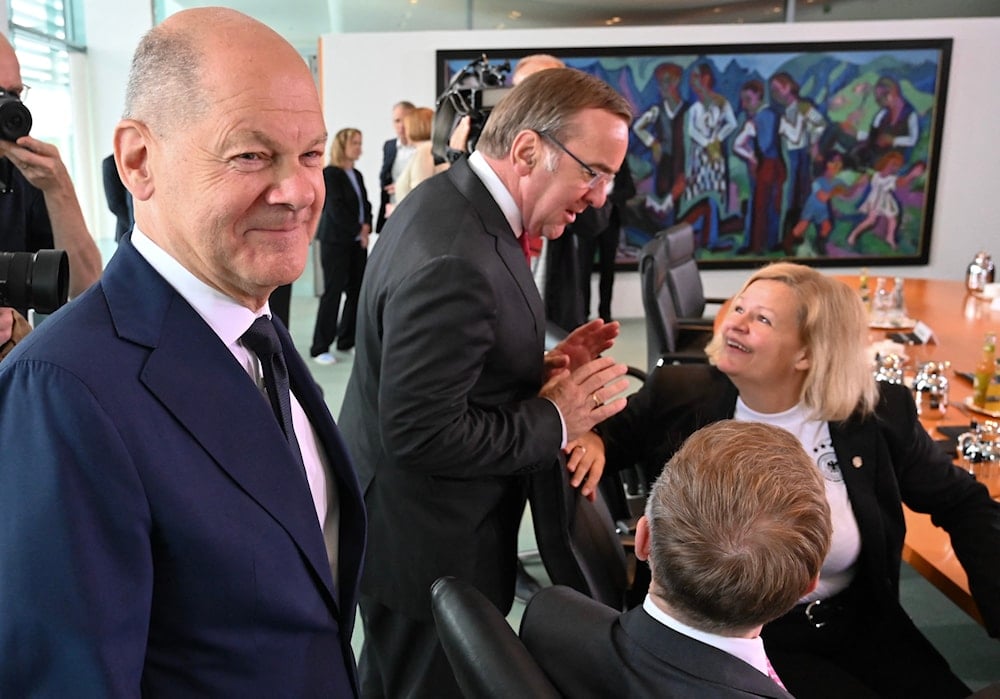Germany's ruling coalition facing decisive 2025 budget standoff
The talks regarding the government's 2025 budget will determine whether Chancellor Olaf Scholz's coalition remains in office.
-

(L-R) German Chancellor Olaf Scholz reacts as German Defense Minister Boris Pistorius and German Interior Minister Nancy Faeser chat prior to the start of the weekly cabinet meeting at the Chancellery in Berlin, on June 19, 2024. (AFP)
The German government is embroiled in a heated dispute over the 2025 budget, raising concerns about the stability of Chancellor Olaf Scholz's coalition, AFP reported.
Scholz's Social Democrats (SPD), the Greens, and the liberal FDP, who took office in 2021, have until the end of the current parliamentary term on July 3 to reach a compromise.
FDP Finance Minister Christian Lindner, known for his strict fiscal policies, is demanding nearly 30 billion euros ($32 billion) in savings, a proposal met with resistance from the Greens and SPD.
Experts warn this budget standoff could potentially collapse the government.
The Sueddeutsche Zeitung daily highlighted the significance of these talks, suggesting they will determine whether the coalition remains in office.
High inflation, manufacturing downturn to blame
This budget negotiation is notably more challenging than previous ones, Jacques-Pierre Gougeon, a German politics expert at the French Institute for International and Strategic Affairs, told AFP.
He cited Germany's recent economic struggles, including high inflation and a manufacturing downturn, as exacerbating factors.
The German Finance Ministry has projected tax revenues for 2025 to be 11 billion euros lower than expected. Additionally, a November ruling by Germany's top court found that the coalition violated the "debt brake," a constitutional limit on borrowing, further restricting new spending.
The coalition parties are also grappling with declining support following poor results in the recent European Parliament elections, where the opposition conservative CDU-CSU bloc and the far-right AfD came first and second, respectively.
A major point of contention is unemployment benefits. Lindner advocates for restricting payouts, arguing they are too costly and do not provide enough of an incentive to get people to return to work. The SPD, however, opposes this idea, as improving benefits was a key campaign promise in 2021 aimed at regaining lower-income voter support.
"Politically, the Social Democrats cannot afford to give it up," Gougeon indicated.
Diplomacy and defense spending also divide the parties. Defense Minister Boris Pistorius of the SPD seeks increased funding for the military, exempting it from the debt brake.
But Foreign Minister Annalena Baerbock of the Greens considered that "it would be disastrous to have to say in a few years' time: we saved the debt brake at the expense of Ukraine and the European security order."
Despite calls to relax debt rules, Lindner and the FDP firmly oppose any changes, considering the debt brake essential.
Scholz, Lindner, and Economy Minister Robert Habeck are set to meet on Sunday to attempt to resolve the crisis. The goal is to avoid a "budget crisis from turning into a crisis of confidence," which could trigger new elections, as reported by the left-leaning daily TAZ.
Ultimately, the parties may be motivated to compromise, aware that a government collapse and subsequent elections would likely not be in their favor.
They "know that they would be swept aside if there were new elections, and will want to avoid them", suggested Gougeon.
Read more: Germany says can no longer give Ukraine Patriot defense systems

 3 Min Read
3 Min Read








